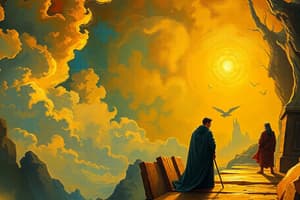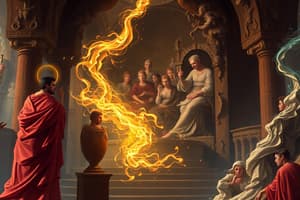Podcast
Questions and Answers
Which of the following is NOT a key characteristic of Baroque art?
Which of the following is NOT a key characteristic of Baroque art?
- Emphasis on subjectivity (correct)
- Dramatic lighting effects
- Contrast between light and darkness (chiaroscuro)
- Grandeur and emotional intensity
What artistic technique was developed during the Renaissance period that allowed for the depiction of depth and three-dimensional space on a flat surface?
What artistic technique was developed during the Renaissance period that allowed for the depiction of depth and three-dimensional space on a flat surface?
- Impasto
- Chiaroscuro
- Pointillism
- Linear perspective (correct)
Which of the following artists is NOT associated with the Italian Renaissance?
Which of the following artists is NOT associated with the Italian Renaissance?
- Raphael
- Leonardo da Vinci
- Rembrandt (correct)
- Michelangelo
Which art movement is characterized by an emphasis on the artistic process, a departure from traditional representational styles, and a focus on subjectivity?
Which art movement is characterized by an emphasis on the artistic process, a departure from traditional representational styles, and a focus on subjectivity?
Which Baroque artist is known for their use of dramatic lighting and chiaroscuro techniques?
Which Baroque artist is known for their use of dramatic lighting and chiaroscuro techniques?
Which art movement is associated with the use of short, distinct brushstrokes and an emphasis on the accurate depiction of natural light?
Which art movement is associated with the use of short, distinct brushstrokes and an emphasis on the accurate depiction of natural light?
Flashcards are hidden until you start studying
Study Notes
Art History
Art history is the study of visual arts from a historical perspective. It encompasses different periods ranging from ancient civilizations to contemporary times. Understanding art history allows us to appreciate various forms and techniques used by artists throughout time. Here's a brief overview of some key periods and movements in art history:
Renaissance Art
The Italian Renaissance was marked by significant changes in how artists perceived their role in society. This period saw the development of linear perspective, a technique that gave depth to paintings and allowed viewers to explore three dimensions within a flat surface. Famous artists like Leonardo da Vinci, Michelangelo, and Raphael created masterpieces such as the Mona Lisa and the Sistine Chapel ceiling during this time.
Baroque Art
Baroque art emerged around 1600 in Rome. Its main characteristics include grandeur, drama, and contrast between light and darkness (chiaroscuro). Baroque painters often used dramatic lighting effects to convey emotional intensity and create tension in their works. Notable artists from this era include Caravaggio and Rembrandt.
Modern Art
Modern art refers to artwork produced during the period roughly from 1860 until the 1970s, although definitions vary. Some characteristics of modern art include a departure from the traditional representational style, an emphasis on subjectivity, and a focus on the artistic process itself. Notable movements within modern art include Impressionism, Cubism, and Surrealism.
Impressionism
Impressionism is an art movement that originated in France in the late 19th century. Impressionist artists sought to capture the feeling of a moment, focusing on the effects of light and color rather than the details of their subjects. Famous impressionist painters include Claude Monet, Pierre-Auguste Renoir, and Edgar Degas.
Each of these periods and movements in art history has contributed significantly to the development of visual arts as we know it today. Studying art history allows us to appreciate the evolution of artistic styles and techniques over time, as well as the cultural contexts that influenced these developments.
Studying That Suits You
Use AI to generate personalized quizzes and flashcards to suit your learning preferences.




